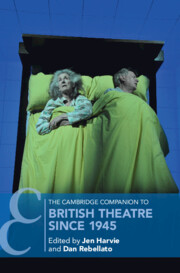Book contents
- The Cambridge Companion to British Theatre since 1945
- Cambridge Companions to Theatre and Performance
- The Cambridge Companion to British Theatre since 1945
- Copyright page
- Contents
- Illustrations
- Contributors
- Acknowledgements
- Chronology of British Theatre since 1945
- Introduction
- Part I Theatre Makers
- Part II Theatre Sectors
- Chapter 4 West End and Commercial Theatre
- Chapter 5 Subsidised Theatre
- Chapter 6 The Fringe
- Part III Theatre Communities
- Part IV Theatre and State
- Further Reading
- Index
- Other Volumes in the Series of Cambridge Companions (continued from p.ii)
Chapter 5 - Subsidised Theatre
Strength, Elitism, Metropolitanism, Racism
from Part II - Theatre Sectors
Published online by Cambridge University Press: 14 March 2024
- The Cambridge Companion to British Theatre since 1945
- Cambridge Companions to Theatre and Performance
- The Cambridge Companion to British Theatre since 1945
- Copyright page
- Contents
- Illustrations
- Contributors
- Acknowledgements
- Chronology of British Theatre since 1945
- Introduction
- Part I Theatre Makers
- Part II Theatre Sectors
- Chapter 4 West End and Commercial Theatre
- Chapter 5 Subsidised Theatre
- Chapter 6 The Fringe
- Part III Theatre Communities
- Part IV Theatre and State
- Further Reading
- Index
- Other Volumes in the Series of Cambridge Companions (continued from p.ii)
Summary
This chapter examines the newly expanded and transformed theatre ecology enabled by the post-war rise of central government subsidy to the arts. It explores subsidy’s ambitions, achievements, and benefits, but also its turbulence and the ideological risks embedded in its deeply ambivalent objectives to foster elite arts but also democratise the arts. The chapter begins by giving a history of British theatre subsidy and considers its contribution to the development of theatre as one of Britain’s great cultural assets through its visionary promotion of such things as artists’ independence, the expansion of theatre infrastructure, and a conception of theatre as a civic right. The chapter then considers some of the hazards arising from how theatre subsidy has been practised by the Arts Council of Great Britain (and successor organisations), especially its tendency to reinforce elite privileges of metropolitanism, class, and whiteness. The chapter critiques the elitism of British arts subsidy’s legacy and proposes transformation of its practices to become more accountable, more democratic, and more dispersed, helping to make British theatre and culture more diverse and better informed by a greater variety of imaginations.
Keywords
- Type
- Chapter
- Information
- The Cambridge Companion to British Theatre since 1945 , pp. 102 - 122Publisher: Cambridge University PressPrint publication year: 2024

